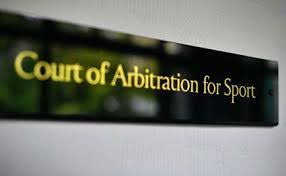
LAUSANNE: The Court of Arbitration for Sport (CAS), world sport's highest court, on Thursday reduced a ban imposed on Russia by the World Anti-Doping Agency (WADA), which had banished the country from the international stage for systematic doping, from four to two years.
Despite the reduction, Russia as a nation is still barred from next year's rearranged Tokyo Olympics, the Beijing Winter Games 2022, and the FIFA World Cup 2022 in Qatar.
Russia has also been disallowed from hosting international events during the ban period.
The ban ends on December 16, 2022, two days after the finals of the World Cup in Qatar.
WADA declared Russia's anti-doping agency (RUSADA) non-compliant for manipulating laboratory data handed over to investigators in January 2019.
"This Panel has imposed consequences to reflect the nature and seriousness of the non-compliance... and to ensure that the integrity of sport against the scourge of doping is maintained," CAS said in its judgment.
The statement added: "The consequences which the Panel has decided to impose are not as extensive as those sought by WADA.
"This should not, however, be read as any validation of the conduct of RUSADA or the Russian authorities.
"It has considered matters of proportionality and, in particular, the need to effect cultural change and encourage the next generation of Russian athletes to participate in clean international sport."
WADA president Witold Banka hailed the ruling. "WADA is pleased to have won this landmark case," Banka stated, adding that the verdict has "clearly upheld our findings that the Russian authorities brazenly and illegally manipulated the Moscow Laboratory data in an effort to cover up an institutionalized doping scheme."
The CAS verdict followed a four-day arbitration hearing between WADA and RUSADA at a secret location last month.
The IOC said it will "carefully evaluate" the decision and its "consequences" for the Tokyo Games and Beijing Winter Games and it will work with international federations and the International Paralympic Committee to have a "consistent approach".
Russian doping scandal timeline (Credit: BBC)
December 2014: As many as 99% of Russian athletes are guilty of doping, a German TV documentary alleges.
November 2015: A WADA commission publishes an independent report alleging widespread corruption, amounting to state-sponsored doping in Russian track and field athletics. RUSADA is declared non-compliant.
May 2016: Former Moscow anti-doping laboratory head Grigory Rodchenkov, who has turned whistleblower, says dozens of Russian athletes at the 2014 Winter Olympics in Sochi had cheated.
July 2016: Russia operated a state-sponsored doping programme for four years across the "vast majority" of summer and winter Olympic sports, says a report from Professor Richard McLaren.
August 2016: International Olympic Committee (IOC) decides against imposing a blanket ban on Russian athletes at the 2016 Olympics in Rio.
August 2016: But International Paralympic Committee takes different stance and bans Russian competitors from 2016 Paralympics in the Brazilian city.
December 2016: WADA publishes the second part of the McLaren report which says more than 1,000 Russian athletes benefited from doping.
January 2017: RUSADA and Russian sport authorities given list of criteria to achieve before winning back recognition.
March 2017: WADA says Russia's anti-doping reforms are not happening quickly enough.
February 2018: Russia are banned from competing at 2018 Winter Olympics in South Korea by the IOC, but 169 athletes who prove they are clean allowed to compete under a neutral flag.
May 2018: WADA writes to RUSADA offering 'compromise' solution.
December 2019: Russia handed a four-year ban from all major sporting events by WADA after RUSADA was declared non-compliant for manipulating laboratory data handed over to investigators
December 2020: CAS rules Russia's ban should be reduced to two years
WADA statement on CAS ruling in full
The World Anti-Doping Agency (WADA) acknowledges the ruling today by the Court of Arbitration for Sport (CAS) to declare the Russian Anti-Doping Agency (RUSADA) non-compliant with the World Anti-Doping Code (Code) for a period of two years and to impose significant consequences. This decision confirms in large part the recommendation made in November 2019 by WADA’s independent Compliance Review Committee (CRC), which was unanimously accepted by the Agency’s Executive Committee (ExCo) on 9 December 2019.
Today’s CAS ruling is a clear endorsement of WADA’s assertion that data from the Moscow Laboratory were intentionally altered prior to and while they were being forensically copied by WADA Intelligence and Investigations (I&I) in January 2019 as part of Operation LIMS, in contravention of critical criteria set by the ExCo when RUSADA was reinstated as compliant, under strict conditions, in September 2018.
WADA President Witold Bańka said: “WADA is pleased to have won this landmark case. We left no stone unturned in investigating this very complex matter and in presenting our case before CAS. The Panel has clearly upheld our findings that the Russian authorities brazenly and illegally manipulated the Moscow Laboratory data in an effort to cover up an institutionalized doping scheme. In the face of continual resistance and denial from Russia, we clearly proved our case, in accordance with due process. In that regard, this ruling is an important moment for clean sport and athletes all over the world.
“We are, however, disappointed that the CAS Panel did not endorse each and every one of our recommended consequences for the four-year period we requested. We believe they were proportionate and reasonable, but ultimately WADA is not the judge but the prosecutor and we must respect the decision of the Panel. These are still the strongest set of consequences ever imposed on any country for doping-related offences and the award clearly endorses the resolute, process-driven approach taken by WADA in dealing effectively with this case. Russia will not be permitted to participate in, bid for or host any covered event, including two editions of the Olympic and Paralympic Games and many other major events, for the next two years. The Russian flag will not fly nor its anthem played. This sends a clear message that institutionalized cheating and concerted efforts to subvert the global anti-doping system will not be tolerated.
“The egregious manipulation by the Russian authorities of data retrieved by WADA Intelligence and Investigations from the Moscow Laboratory was the latest in a long list of offences and it has led today to significant consequences for the authorities. Russian authorities were afforded every opportunity to get their house in order and re-join the global anti-doping community for the good of their athletes and the integrity of sport, but they chose instead to continue on their path of deception and denial.”
WADA Director General Olivier Niggli said: “Today, the global anti-doping program is much stronger than it was at the time of the Sochi Olympic and Paralympic Games in 2014, and with the revised World Anti-Doping Code that comes into force on 1 January 2021, the program will be even stronger. The CAS ruling was made possible by the enhancements that have been put in place by WADA since the end of 2014 when the Russian doping program was first exposed. In particular, WADA’s acquisition of investigative powers in 2015 and the growth of our independent Intelligence and Investigations Department have proven to be a game-changer, while the International Standard for Compliance by Signatories (ISCCS) that entered into effect in April 2018 has stood up to this rigorous test. This CAS decision in such a high-profile and complex case demonstrates that the legal framework underpinning anti-doping works and works well.
“WADA’s determination to act resolutely and lawfully in the face of the Russian doping crisis was the correct approach. The diligence of our investigators, the vision of the independent Compliance Review Committee and our ability to take action via the Compliance Standard have enabled WADA to make the right decisions at every stage.
“WADA can now focus its energy on ensuring that those athletes, who were identified as potentially violating the rules as part of our wide-ranging Operation LIMS investigation, are brought to justice. WADA will continue to follow up with the International Federations to which we provided evidence packages in April 2020 as part of Operation LIMS to ensure those cases are dealt with swiftly and appropriately. If they are not, we will continue to exercise our independent right of appeal to CAS.
“It is also crucial that a credible, operationally independent and efficient anti-doping system prevails in Russia for the good of all athletes. To that end, we welcome the CAS Panel’s confirmation that a condition of RUSADA’s reinstatement once the two-year period has elapsed will be that WADA remains satisfied that RUSADA’s operational independence is being respected and there is no improper outside interference.”
As per Article 10.4.1 of the ISCCS, WADA expects the full reasoned decision will be publicly reported by CAS next week.
- Log in to post comments
